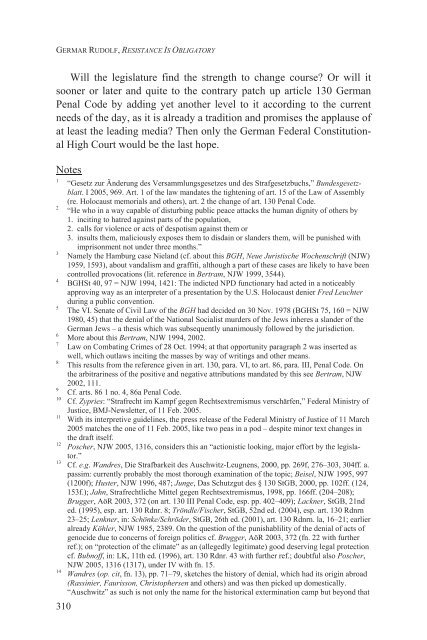Germar Rudolf, Resistance Is Obligatory (2012; PDF-Datei
Germar Rudolf, Resistance Is Obligatory (2012; PDF-Datei
Germar Rudolf, Resistance Is Obligatory (2012; PDF-Datei
You also want an ePaper? Increase the reach of your titles
YUMPU automatically turns print PDFs into web optimized ePapers that Google loves.
GERMAR RUDOLF, RESISTANCE IS OBLIGATORY<br />
Will the legislature find the strength to change course? Or will it<br />
sooner or later and quite to the contrary patch up article 130 German<br />
Penal Code by adding yet another level to it according to the current<br />
needs of the day, as it is already a tradition and promises the applause of<br />
at least the leading media? Then only the German Federal Constitutional<br />
High Court would be the last hope.<br />
Notes<br />
1<br />
310<br />
“Gesetz zur Änderung des Versammlungsgesetzes und des Strafgesetzbuchs,” Bundesgesetzblatt.<br />
I 2005, 969. Art. 1 of the law mandates the tightening of art. 15 of the Law of Assembly<br />
(re. Holocaust memorials and others), art. 2 the change of art. 130 Penal Code.<br />
2<br />
“He who in a way capable of disturbing public peace attacks the human dignity of others by<br />
1. inciting to hatred against parts of the population,<br />
2. calls for violence or acts of despotism against them or<br />
3. insults them, maliciously exposes them to disdain or slanders them, will be punished with<br />
imprisonment not under three months.”<br />
3<br />
Namely the Hamburg case Nieland (cf. about this BGH, Neue Juristische Wochenschrift (NJW)<br />
1959, 1593), about vandalism and graffiti, although a part of these cases are likely to have been<br />
controlled provocations (lit. reference in Bertram, NJW 1999, 3544).<br />
4<br />
BGHSt 40, 97 = NJW 1994, 1421: The indicted NPD functionary had acted in a noticeably<br />
approving way as an interpreter of a presentation by the U.S. Holocaust denier Fred Leuchter<br />
during a public convention.<br />
5<br />
The VI. Senate of Civil Law of the BGH had decided on 30 Nov. 1978 (BGHSt 75, 160 = NJW<br />
1980, 45) that the denial of the National Socialist murders of the Jews inheres a slander of the<br />
German Jews – a thesis which was subsequently unanimously followed by the jurisdiction.<br />
6<br />
More about this Bertram, NJW 1994, 2002.<br />
7<br />
Law on Combating Crimes of 28 Oct. 1994; at that opportunity paragraph 2 was inserted as<br />
well, which outlaws inciting the masses by way of writings and other means.<br />
8<br />
This results from the reference given in art. 130, para. VI, to art. 86, para. III, Penal Code. On<br />
the arbitrariness of the positive and negative attributions mandated by this see Bertram, NJW<br />
2002, 111.<br />
9<br />
Cf. arts. 86 1 no. 4, 86a Penal Code.<br />
10<br />
Cf. Zypries: “Strafrecht im Kampf gegen Rechtsextremismus verschärfen,” Federal Ministry of<br />
Justice, BMJ-Newsletter, of 11 Feb. 2005.<br />
11<br />
With its interpretive guidelines, the press release of the Federal Ministry of Justice of 11 March<br />
2005 matches the one of 11 Feb. 2005, like two peas in a pod – despite minor text changes in<br />
the draft itself.<br />
12<br />
Poscher, NJW 2005, 1316, considers this an “actionistic looking, major effort by the legislator.”<br />
13<br />
Cf. e.g. Wandres, Die Strafbarkeit des Auschwitz-Leugnens, 2000, pp. 269f, 276–303, 304ff. a.<br />
passim: currently probably the most thorough examination of the topic; Beisel, NJW 1995, 997<br />
(1200f); Huster, NJW 1996, 487; Junge, Das Schutzgut des § 130 StGB, 2000, pp. 102ff. (124,<br />
153f.); Jahn, Strafrechtliche Mittel gegen Rechtsextremismus, 1998, pp. 166ff. (204–208);<br />
Brugger, AöR 2003, 372 (on art. 130 III Penal Code, esp. pp. 402–409); Lackner, StGB, 21nd<br />
ed. (1995), esp. art. 130 Rdnr. 8; Tröndle/Fischer, StGB, 52nd ed. (2004), esp. art. 130 Rdnrn<br />
23–25; Lenkner, in: Schönke/Schröder, StGB, 26th ed. (2001), art. 130 Rdnrn. la, 16–21; earlier<br />
already Köhler, NJW 1985, 2389. On the question of the punishablility of the denial of acts of<br />
genocide due to concerns of foreign politics cf. Brugger, AöR 2003, 372 (fn. 22 with further<br />
ref.); on “protection of the climate” as an (allegedly legitimate) good deserving legal protection<br />
cf. Bubnoff, in: LK, 11th ed. (1996), art. 130 Rdnr. 43 with further ref.; doubtful also Poscher,<br />
NJW 2005, 1316 (1317), under IV with fn. 15.<br />
14<br />
Wandres (op. cit, fn. 13), pp. 71–79, sketches the history of denial, which had its origin abroad<br />
(Rassinier, Faurisson, Christophersen and others) and was then picked up domestically.<br />
“Auschwitz” as such is not only the name for the historical extermination camp but beyond that















